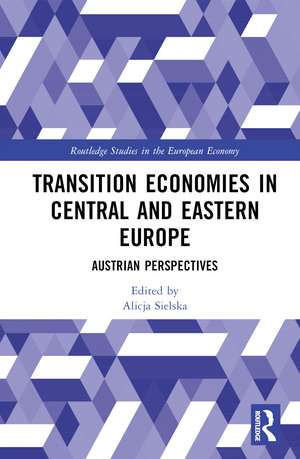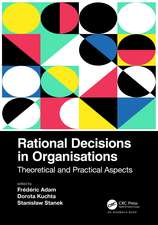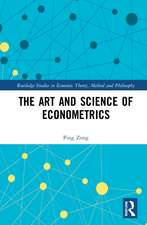Transition Economies in Central and Eastern Europe: Austrian Perspectives: Routledge Studies in the European Economy
Editat de Alicja Sielskaen Limba Engleză Hardback – 16 aug 2023
The book is divided into four sections. The first part presents the Austrian perspective on socialism; the second discusses a new approach to the Austrian theory of interventionism, suggesting that the theory should be revised and that its scope should be extended beyond the transformation of the 1990s into the realm of contemporary economic reality; the third part is oriented towards pragmatic considerations, whereby the authors employ the Austrian perspective to analyze specific factors that, according to their view, had an impact on the transformational success of post-communist countries; while the final part is ideological and philosophical in character. Here the authors search for certain principia that govern broadly understood social and economic transformations.
The book is addressed to those interested in the Austrian School of Economics and the political transformation of the 1990s, as well as those who wish to understand contemporary economic trends.
| Toate formatele și edițiile | Preț | Express |
|---|---|---|
| Paperback (1) | 310.55 lei 6-8 săpt. | |
| Taylor & Francis Ltd. – 18 dec 2024 | 310.55 lei 6-8 săpt. | |
| Hardback (1) | 1002.95 lei 6-8 săpt. | |
| Taylor & Francis – 16 aug 2023 | 1002.95 lei 6-8 săpt. |
Din seria Routledge Studies in the European Economy
-
 Preț: 324.39 lei
Preț: 324.39 lei -
 Preț: 303.87 lei
Preț: 303.87 lei - 17%
 Preț: 148.76 lei
Preț: 148.76 lei - 9%
 Preț: 934.47 lei
Preț: 934.47 lei -
 Preț: 311.41 lei
Preț: 311.41 lei -
 Preț: 316.32 lei
Preț: 316.32 lei - 18%
 Preț: 1057.13 lei
Preț: 1057.13 lei - 18%
 Preț: 1058.65 lei
Preț: 1058.65 lei - 13%
 Preț: 338.33 lei
Preț: 338.33 lei - 25%
 Preț: 524.78 lei
Preț: 524.78 lei -
 Preț: 494.48 lei
Preț: 494.48 lei - 26%
 Preț: 764.62 lei
Preț: 764.62 lei -
 Preț: 466.07 lei
Preț: 466.07 lei - 25%
 Preț: 823.63 lei
Preț: 823.63 lei - 18%
 Preț: 1057.09 lei
Preț: 1057.09 lei - 26%
 Preț: 819.48 lei
Preț: 819.48 lei - 26%
 Preț: 846.50 lei
Preț: 846.50 lei - 18%
 Preț: 1049.99 lei
Preț: 1049.99 lei - 18%
 Preț: 1004.20 lei
Preț: 1004.20 lei - 18%
 Preț: 1332.21 lei
Preț: 1332.21 lei - 26%
 Preț: 765.43 lei
Preț: 765.43 lei - 28%
 Preț: 848.15 lei
Preț: 848.15 lei -
 Preț: 223.01 lei
Preț: 223.01 lei - 18%
 Preț: 703.79 lei
Preț: 703.79 lei - 28%
 Preț: 847.50 lei
Preț: 847.50 lei - 18%
 Preț: 699.96 lei
Preț: 699.96 lei - 25%
 Preț: 828.12 lei
Preț: 828.12 lei - 18%
 Preț: 1159.70 lei
Preț: 1159.70 lei - 18%
 Preț: 1174.70 lei
Preț: 1174.70 lei - 18%
 Preț: 1057.89 lei
Preț: 1057.89 lei -
 Preț: 484.47 lei
Preț: 484.47 lei - 18%
 Preț: 711.10 lei
Preț: 711.10 lei - 26%
 Preț: 848.15 lei
Preț: 848.15 lei -
 Preț: 413.13 lei
Preț: 413.13 lei - 26%
 Preț: 849.65 lei
Preț: 849.65 lei - 26%
 Preț: 875.55 lei
Preț: 875.55 lei - 26%
 Preț: 762.57 lei
Preț: 762.57 lei - 18%
 Preț: 1437.35 lei
Preț: 1437.35 lei - 18%
 Preț: 1108.37 lei
Preț: 1108.37 lei -
 Preț: 495.09 lei
Preț: 495.09 lei - 15%
 Preț: 703.48 lei
Preț: 703.48 lei - 31%
 Preț: 763.81 lei
Preț: 763.81 lei
Preț: 1002.95 lei
Preț vechi: 1223.11 lei
-18% Nou
Puncte Express: 1504
Preț estimativ în valută:
191.91€ • 200.91$ • 158.80£
191.91€ • 200.91$ • 158.80£
Carte tipărită la comandă
Livrare economică 05-19 aprilie
Preluare comenzi: 021 569.72.76
Specificații
ISBN-13: 9781032518091
ISBN-10: 103251809X
Pagini: 200
Ilustrații: 8 Tables, black and white; 9 Line drawings, black and white; 9 Illustrations, black and white
Dimensiuni: 156 x 234 x 11 mm
Greutate: 0.53 kg
Ediția:1
Editura: Taylor & Francis
Colecția Routledge
Seria Routledge Studies in the European Economy
Locul publicării:Oxford, United Kingdom
ISBN-10: 103251809X
Pagini: 200
Ilustrații: 8 Tables, black and white; 9 Line drawings, black and white; 9 Illustrations, black and white
Dimensiuni: 156 x 234 x 11 mm
Greutate: 0.53 kg
Ediția:1
Editura: Taylor & Francis
Colecția Routledge
Seria Routledge Studies in the European Economy
Locul publicării:Oxford, United Kingdom
Public țintă
PostgraduateCuprins
Introduction (Alicja Sielska) PART I – PRIMER Chapter 1. The Failure of Socialist Central Planning and the Negative Effects from Implementing ESG (Richard Ebeling) Chapter 2. "Carl Menger and the Post-Soviet Transition of Central and European Economies" (Barbara Kolm) PART II – NEW PERSPECTIVES IN THE THEORY OF INTERVENTIONISM Chapter 3. "The Disinterventionist Spiral and the Transition Process in Easten and Central Europe" (Philipp Bagus) Chapter 4. "Free-trade, stable money and market reforms by top-down design Misesian "desperado policy" as daily routine" (Josef Šíma) Chapter 5. "Röpke and his theory of deglobalization. An application to understand current perspectives" (David Sanz-Bas, Miguel Ángel Echarte, Satheesh Varghese, Sergio Náñez) PART III – ECONOMIC TRANSITIONS EXPLAINED Chapter 6. "Entrepreneurship and black markets under socialism. The case of former Eastern bloc" (Gabriel Mursa) Chapter 7. From Power to Market: The Transformation of Centrally Planned Economies and the Theories of Institutional Change (Marek Hudik, Shahab Sharfaei) Chapter 8. The Role of Foreign Capital in Economic Transformation in Poland (Mateusz Benedyk) Chapter 9. "How far are CEE economies from free-market ideals? A look from the point of view of the Austrian School of Economics theory." (Marcin Mrowiec) PART IV – SOCIAL AND ECONOMIC TRANSITIONS: PATTERNS, VALUES AND IDEAS Chapter 10. "Identifying Bottlenecks of Transformation (Mateusz Machaj) Chapter 11. "The Proactive Society: An Introductory Exposition" (Jakub Bożydar Wiśniewski) Chapter 12. "Poverty Relief as a Rule-Based Discovery Procedure: Is a Basic Income Compatible with a Hayekian Welfare State" (Otto Lehto) Chapter 13. Justice in the 21 st Century: Epistemic Argument that Rawls was Wrong (Žiga Turk)
Notă biografică
Alicja Sielska is Assistant Professor in the Institute of Economic Sciences in the Faculty of Law, Administration and Economics at the University of Wroclaw, Poland and Researcher at the University of New York, Prague, Czech Republic.
Recenzii
"Alicja Sielska has assembled an array of chapters that seek to apply a distinctly Austrian school approach to political economy to the economies of Central and Eastern Europe, broadly considered...the attention to the everyday life of comparative economic systems, the dynamics of intervention, the ideological foundations of a free society, and the managerial mechanisms that link financial capital, human capital, and social progress mark this text as a critical companion for all Austrian economists."
Anthony J Evans, ESCP Business School.
Anthony J Evans, ESCP Business School.
Descriere
This book describes the Austrian view of socialism and in such a context explains the transformational success of the countries of Central and Eastern Europe. Moreover, it shows that the theory of interventionism has not lost its relevance, and the theory itself—along with its modifications—may be used to explain current economic events.























